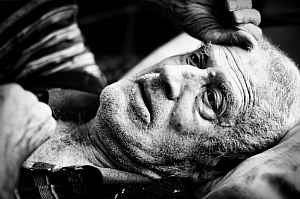Crisis in Correctional Care: Elderly Inmates
Parole is allowed under a Virginia rule that enables the state to release people over 60 who have served at least ten years. More than a thousand inmates have been eligible under this geriatric provision, but only 40 have been released since 2001. One key question: Where would they go? Sandy Hausman produced this series for WVTF Radio as a 2013 National Health Journalism Fellow.
The other parts in the series can be found here:
Diabetes and Death in Virginia Prisons
Crisis in Correctional Care: Inmates Allege Medical Neglect

When inmates are locked in prison, they lose their freedom - and years of their lives. Experts like Tina Maschi, a professor at Fordham University in New York, says time behind bars makes prisoners look and feel ten years older than they are (Click here for audio).
“They call this accelerated aging, and they attribute it to chronic smoking, substance use, possibly traumatic brain injury, poor health practices, coupled with the stressful conditions of confinement.”
Steve Colosi hopes that won’t happen to him. He’s 60 but tries to take good care of himself at the Buckingham Correctional Center - about 40 miles south of Charlottesville, but it isn’t easy. The state spends just $2.10 a day to feed prisoners, and snacks sold by the commissary are high in salt and fat.
The Department of Corrections would not allow an in-person interview with Colosi - deeming it a security risk - so he spoke to me from a pay phone in the prison. Colosi is eligible for parole under a rule that allows the state to release people over 60 who have served at least ten years. He’s never broken a prison rule, has taught classes so many fellow prisoners could get their GED, and is active in the inmates’ Catholic group, but Colosi is unlikely to be released, because the parole board will consider his crime. He was convicted of hiring two men to throw acid in the face of his estranged 29-year-old wife. She was severely disfigured, inhaled the lye and died three weeks after the attack. Colosi understands how angry people are about that crime.
“I feel terrible for the victims out there and what they’ve had to go through, but the crime that was committed is never going to change. You can’t un-ring that bell, and believe me, there’s a lot of remorse in here.”
And the former Virginia Beach businessman doesn’t think the state can afford to be vindictive. The Department of Corrections could not say what it spends, on average, to house elderly prisoners, but one private provider of healthcare in Virginia, The GEO Group, says the national average is $68,000 a year.
“There’s 1,100 inmates that are over 60, and if you multiply that times 68 thousand, that’s $74 million. Now for $2,300 a year you can put an ankle bracelet on a man and monitor his whereabouts 24/7. So for $72 million savings, you could hire a lot of teachers, police officers and youth counselors for these kids to maybe kind of head some of this stuff off at the pass.”
Critics point out that many elderly inmates are too frail to pose a risk to the public, but they are at risk behind prison walls - vulnerable to assaults and manipulation. Virginia tries to minimize those risks and improve medical care by concentrating elderly and ailing prisoners at the Deerfield Correctional Center. Colosi says it’s the place old prisoners go to die.
“And the warden there made a statement in the newspaper a couple of years ago. I don’t know if he got in trouble or not, but he said ‘I have to stand back and watch 100 wheelchairs go to lunch when they call chow, and I have to ask myself, "What are we doing here?”'"
More than a thousand inmates have been eligible for parole under the geriatric provision, but only 40 have been released since 2001. By 2018, the state says it will have more than 8,000 men and women over 60 who are eligible, but if released, where would they go? Many have been locked up so long that family members are gone or estranged, and private nursing homes won’t take them.
This story was originially published on WVTF.org.
